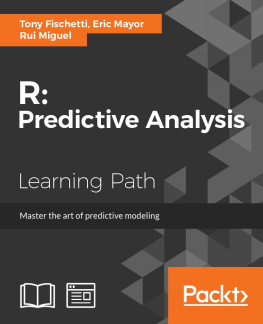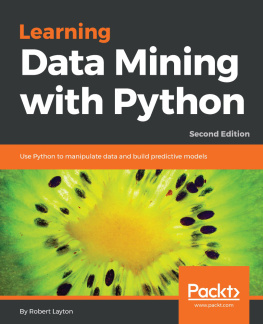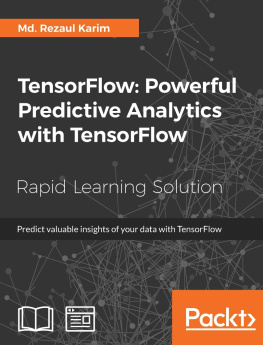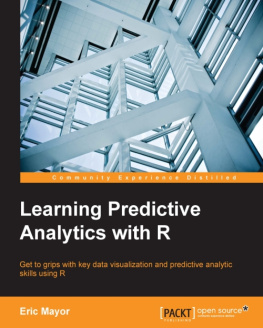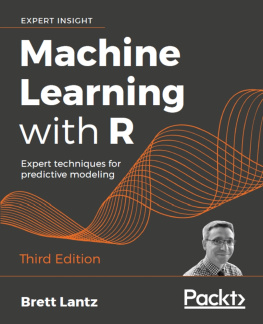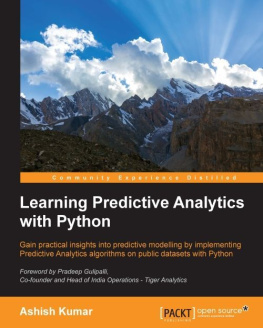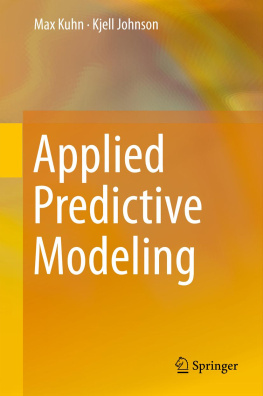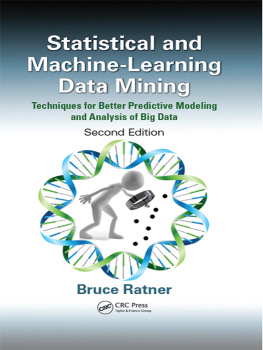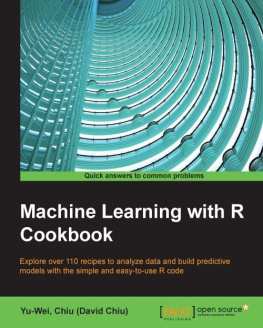Tony Fischetti - R: Predictive Analysis
Here you can read online Tony Fischetti - R: Predictive Analysis full text of the book (entire story) in english for free. Download pdf and epub, get meaning, cover and reviews about this ebook. year: 2017, publisher: Packt Publishing, genre: Home and family. Description of the work, (preface) as well as reviews are available. Best literature library LitArk.com created for fans of good reading and offers a wide selection of genres:
Romance novel
Science fiction
Adventure
Detective
Science
History
Home and family
Prose
Art
Politics
Computer
Non-fiction
Religion
Business
Children
Humor
Choose a favorite category and find really read worthwhile books. Enjoy immersion in the world of imagination, feel the emotions of the characters or learn something new for yourself, make an fascinating discovery.
- Book:R: Predictive Analysis
- Author:
- Publisher:Packt Publishing
- Genre:
- Year:2017
- Rating:5 / 5
- Favourites:Add to favourites
- Your mark:
R: Predictive Analysis: summary, description and annotation
We offer to read an annotation, description, summary or preface (depends on what the author of the book "R: Predictive Analysis" wrote himself). If you haven't found the necessary information about the book — write in the comments, we will try to find it.
Master the art of predictive modeling
About This Book
- Familiarize yourself with the most common data mining tools of R, such as k-means, hierarchical regression, linear regression, Nave Bayes, decision trees, text mining and so on.
- We emphasize important concepts, such as the bias-variance trade-off and over-fitting, which are pervasive in predictive modeling
Who This Book Is For
If you work with data and want to become an expert in predictive analysis and modeling, then this Learning Path will serve you well. It is intended for budding and seasoned practitioners of predictive modeling alike. You should have basic knowledge of the use of R, although its not necessary to put this Learning Path to great use.
What You Will Learn
- Get to know the basics of Rs syntax and major data structures
- Write functions, load data, and install packages
- Use different data sources in R and know how to interface with databases, and request and load JSON and XML
- Identify the challenges and apply your knowledge about data analysis in R to imperfect real-world data
- Predict the future with reasonably simple algorithms
- Understand key data visualization and predictive analytic skills using R
- Understand the language of models and the predictive modeling process
In Detail
Predictive analytics is a field that uses data to build models that predict a future outcome of interest. It can be applied to a range of business strategies and has been a key player in search advertising and recommendation engines.
The power and domain-specificity of R allows the user to express complex analytics easily, quickly, and succinctly. R offers a free and open source environment that is perfect for both learning and deploying predictive modeling solutions in the real world. This Learning Path will provide you with all the steps you need to master the art of predictive modeling with R.
We start with an introduction to data analysis with R, and then gradually youll get your feet wet with predictive modeling. You will get to grips with the fundamentals of applied statistics and build on this knowledge to perform sophisticated and powerful analytics. You will be able to solve the difficulties relating to performing data analysis in practice and find solutions to working with messy data, large data, communicating results, and facilitating reproducibility. You will then perform key predictive analytics tasks using R, such as train and test predictive models for classification and regression tasks, score new data sets and so on. By the end of this Learning Path, you will have explored and tested the most popular modeling techniques in use on real-world data sets and mastered a diverse range of techniques in predictive analytics.
This Learning Path combines some of the best that Packt has to offer in one complete, curated package. It includes content from the following Packt products:
- Data Analysis with R, Tony Fischetti
- Learning Predictive Analytics with R, Eric Mayor
- Mastering Predictive Analytics with R, Rui Miguel Forte
Style and approach
Learn data analysis using engaging examples and fun exercises, and with a gentle and friendly but comprehensive learn-by-doing approach. This is a practical course, which analyzes compelling data about life, health, and death with the help of tutorials. It offers you a useful way of interpreting the data thats specific to this course, but that can also be applied to any other data. This course is designed to be both a guide and a reference for moving beyond the basics of...
Tony Fischetti: author's other books
Who wrote R: Predictive Analysis? Find out the surname, the name of the author of the book and a list of all author's works by series.

